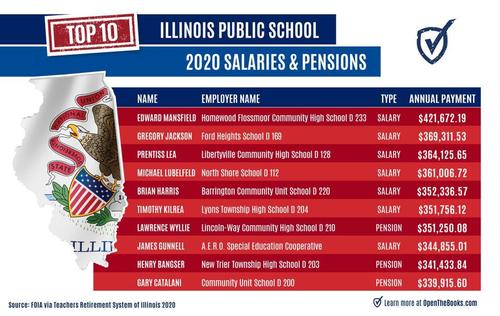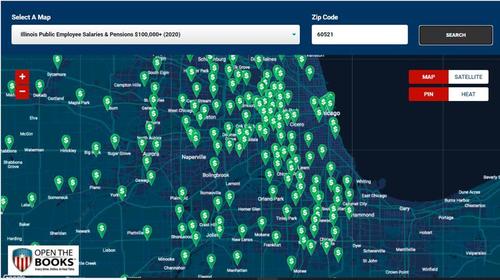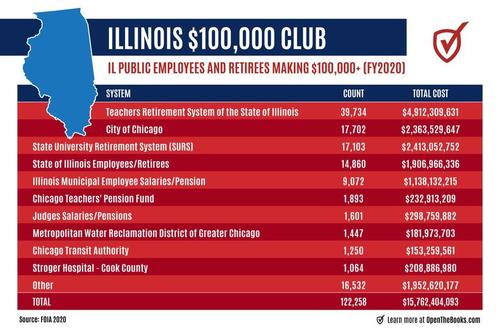Why Illinois Is In Trouble: 122,258 Public Employees Earned $100,000+ Costing Taxpayers $15.8 Billion
By Adam Andrzejewski of OpenTheBooks.com, first published in Forbes,
Illinois public employees and retirees with $100,000+ paychecks grew from 109,881 (2019) to an all-time high of 122,258 in 2020 – costing taxpayers $15.8 billion.
Congressional “bailouts” made it possible. The recent $1.9 trillion American Rescue Act provided an additional $13.5 billion to Illinois state and local governments. (Look up your hometown here — $350 billion flowed to states and 30,000 communities.)
Auditors at OpenTheBooks.com compiled the list of six-figure earners from Freedom of Information Act requests.
Barbers at State Corrections trimmed off $115,000; janitors at the State Toll Highway Authority cleaned up $123,000; bus drivers in Chicago made $174,000; line workers on the Chicago Transit Authority earned $222,278; community college presidents made $418,677; university doctors earned up to $2 million; and 171 small town managers out-earned the Illinois governor ($181,670).
Our interactive mapping tool allows users to quickly review the 122,258 public employees and retirees across Illinois making more than $100,000 (by ZIP code). Just click a pin and scroll down to see the results in your neighborhood rendered in the chart beneath the map.
Auditing the largest pay and pension systems in Illinois:
Public schools (40,000) – Last year, nearly 24,500 educators earned a six-figure salary while more than 15,500 retirees received six-figure pensions. Most Illinois schools were not back to fulltime, in-person instruction as of March 2021.
Sixteen retired school superintendents pocketed $300,000+ in retirement pensions, among them Lawrence A. Wyllie (Lincoln-Way CHSD 210 – $351,250); Henry Bangser (New Trier Township HSD 203 – $341,433); Gary Catalani (Wheaton-Warrenville Unit SD 200 – $339,915); Laura Murray (Homewood-Flossmoor CHSD 233 – $334,418); and Mary Curley (Hinsdale CCSD 181 – $324,796).
Chicago (25,000) – We calculated that the city paid out $737 million in extra pay (overtime, vacation, supplemental, fitness, etc.) above base salaries. The Chicago police and fire departments paid nearly 1,000 employees between $200,000 and $430,000 in cash compensation last year.
The Chicago Transit Authority, operator of mass transit in the city including the “L” train, paid rail service supervisors up to $239,806, ironworkers as much as $225,579, and line workers collected $222,278. A signal maintainer took home $191,627, a telephone line worker was paid $190,030 and a customer service representative made $185,152.
Colleges & universities (17,100) – The state of Illinois paid University of Illinois basketball coach Bradley Underwood $3 million last year. Top paid junior college presidents included a hefty salary for Christine Jean Sobek (Waubonsee Community College — $418,677), and a big retirement pension for Vernon Crawley (Moraine Valley Community College— $406,600).
Current Illinois State University President Larry Dietz (salary: $364,820) was out-earned by retired ISU president Clarence A. Bowman, who collected a $422,039 pension.
Fady Toufic Charbel ($2 million); Mark Gonzalez ($1.2 million); and Konstantin Slavin ($1 million) are million-dollar doctors at the University of Illinois at Chicago (UIC). A UIC pension paying out $540,591 goes to a retired doctor, Tapas Das Gupta. The retired doctor from University of Illinois –Springfield, Leslie Heffez, has the largest pension at $635,122.
State of Illinois (16,500) – Six-figure salaries and pension payouts amounted to nearly $2 billion last year. Eleven barbers at Corrections made between $100,000 and $115,000. Veterans, Human Services, and Corrections paid between $100,000 and $260,900 to 559 nurses.
The ten top paid sergeants at the State Police earned between $200,100 and $268,700 while 238 officers made between $150,000 and $268,700.
A court-ordered monitor, Dr. Stewart Pablo, was paid $352,000 by taxpayers to report on the barriers to access mental healthcare within the prison system – his pay amounts to nearly $1.4 million during the past four years.
Cities & villages (9,100) – Small town managers collect high pay, along with perks and pension benefits. Top paid managers were Richard Nahrstadt (Village of Northbrook – $336,722); Stephen Gulden (Village of Romeoville – $301,821); Michael J. Ellis (Village of Grayslake –- $294,980); Jeffrey Rowitz (Village of Northbrook – $291,875); and Reid Ottesen (Village of Palatine— $283,899).
The interim village manager in Romeoville responded to our comment request and said that Stephen Gulden’s extra payments beyond $191,141 were the result of his retirement in November.
In the shadow of O’Hare International Airport, the small town of Rosemont (pop. 4,200) has three highly compensated officials: Patrick Nagle ($302,313—head of the Allstate Arena entertainment venue), Christopher R. Stephens ($295,813—Executive Director of the Donald E. Stephens Convention Center), and mayor Bradley A. Stephens ($269,998) – who also made $69,413 as an elected state representative.
A village spokesperson noted that the two arenas were not mothballed during the last year, but continued to have a limited schedule.
Private associations, nonprofits and retired lawmakers
There are several legal loopholes for individuals to access state funding through private associations, nonprofit organizations, and state legislative bodies.
-
Retired Chicago Mayor Richard M. Daley (D) double dipped the pension system for nearly $238,000. Daley made $153,479 per year in state lawmaker pension payouts after a short eight-year career as a state senator plus another $83,784 per year in city pension payouts for his 22 years as the mayor of Chicago.
-
Three top paid earners within the municipal-government pension system work for private associations – not government. Brad Cole of the Illinois Municipal League pulled down $407,656, up from $313,997 (2019). Peter Murphy, executive director of Illinois Association of Park Districts, made $378,070, while Brett Davis, executive director of the Park District Risk management Agency, brought in $349,269.
These private nonprofits and associations muscled their way into the government system where taxpayers help fund and guarantee retirement annuities.
-
Peter B. Maggs and James J. Stukel are collecting government pensions of $453,512 and $439,575, respectively. Both retired from the University of Illinois Foundation, the nonprofit private fundraising agency for the University of Illinois.
-
Former Illinois Governor Jim Edgar (R) double dipped pension systems: General Assembly pension ($181,230 per year) and University Retirement System pension ($85,140). After “retiring” from the University of Illinois, he was hired back part time for another $62,769. Last year, Edgar’s total payout from all sources was $329,139.
We estimate that Edgar earned $2.4 million in compensation from the University of Illinois (2000-2013) and another $2.2 million in pension payments already paid-out from his career as legislator, secretary of state and governor.
Highly compensated locals
DuPage County employees have a history of hefty salaries and pensions. Top paid county employees included Richard Rushing ($263,509—deputy sheriff); Peter Balgemann ($241,168— chief deputy auditor); Ibrahim Khaja ($238,108—psychiatrist); Daniel Baran ($237,709—facilities manager); and Daniel Raysby ($227,959— detective).
Local park district administrators out earned the state director of parks ($156,900). These included James Pilmer ($256,256) at Fox Valley; Raymond McGury ($215,872) at Naperville; Michael Bernard ($212,708) at Wheaton. However, the top pension exceeded the highest salary: Elizabeth Kutska ($279,025) also from Wheaton.
Even water district employees tapped into the largess. David Miller pulled down $219,336 at the North Shore Water Reclamation District while Larry McFall made $214,901 at the Rock River Water Reclamation District. John Spatz made $214,479 at the DuPage Water Commission.
Possible solutions to the Illinois crisis
Last April, Illinois State Senate President Don Harmon wrote a letter to Congress asking for a $40 billion bailout. Congress eventually provided $13.5 billion.
Then, in November, Illinois Governor J.B. Pritzker wanted to hike the income tax during pandemic and pushed for a state constitutional amendment to allow for a progressive income tax. However, the voters shot it down, 55-45.
Our updated analysis at OpenTheBooks.com shows that an Illinois family of four now owes more in unfunded pension liabilities ($98,000) than they earn in household income ($63,585). In a state of 13 million residents, every man, woman, and child owes $24,000 — on an estimated $317 billion pension liability.
Illinois may have already crossed the Rubicon.
U.S. Senate Leader Mitch McConnell suggested another path last April, “I would certainly be in favor of allowing states to use the bankruptcy route.” McConnell specifically mentioned Illinois along with Connecticut, California, and New York.



Comments
Post a Comment